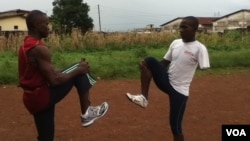FREETOWN, Sierra Leone — For the first time in history an athlete from Sierra Leone is competing in the Paralympic games which take place in London at the end of August.
Mohamed Kamara's coach shouts commands at his young athlete who bolts across an empty football (soccer) field in Freetown, the capital city of Sierra Leone.
Sweat drips down Kamara's face as he makes his own record time of 11.45 seconds covering 100 meters.
The 22-year-old is doing last minute training before his trip to London next week.
He is competing in sprint running and has been training six times a week, four to five hours-a-day for the past seven months.
Kamara says he is determined to win a medal for his country. "I'm going to do it, I'm going to prove it, to take the Salone flag higher. To take the nation higher," he said.
Like most athletes Kamara knows he has to work hard to get ahead. And he says he is ready for the challenge.
But this journey has not been easy.
Kamara was just a child when a civil war hit Sierra Leone in the 1990s.
During that time rebel fighters were notorious for cutting off people's limbs.
Kamara was just one of thousands of victims.
He remembers the day the rebels attacked his home. "And so they chopped our hands and they killed my mother and father in front of me," he said.
He managed to escape from the brutal scene. And a man eventually found him hiding in a bush and brought him to the hospital for treatment.
His entire arm had to be amputated because of his hand being cut off.
Kamara's relatives heard where he was and took him in.
He says as a child he was constantly teased because of his disability. So to clear his mind he decided to start running as a hobby.
He says he did not want to live a life that so many amputees do. "I don't want to go to the streets and beg," he said.
Little did he know running would one day get him to the point of competing.
In 2002 he was discovered by a track coach Abu Bakar Conteh.
They have been training together ever since.
This coach says his athlete's drive is unstoppable. "He's a man with dedication, he's a man with talent, he's a man with determination …so all those difficulties and discouragement he does absorb it and take courage for himself in order to pursue his talent," he said.
Kamara's family is also proud of how far the young athlete has come. His uncle Hamid Bangura says he will be glued to a television set when his nephew competes. "I'm very happy because he is going to participate for the country. I'm so glad over that," he said.
Back on the football field, Kamara explains that there have been financial challenges for him too because his family lives hand to mouth.
He says the Paralympic committee does pay for some expenses such as travel to London and accommodations there.
But the day to day things like food and transportation for practice come out of his own pocket. " I don't have sufficient food to eat for the competition," he said.
Still, it is the thought of the competition and what representing his country could mean for other physically challenged people that keeps him going.
He says amputees are so marginalized right now in Sierra Leone and he wants to give them a voice and show that they are just as good as anyone else and can accomplish anything they set their minds to.




